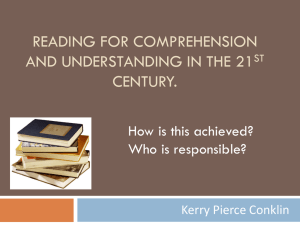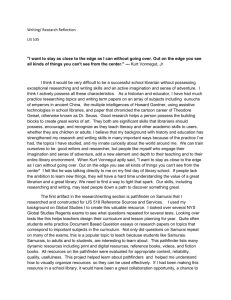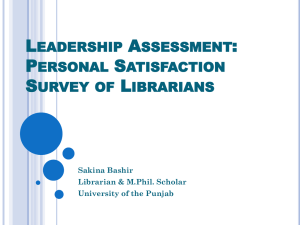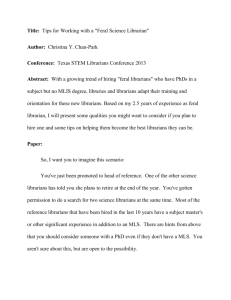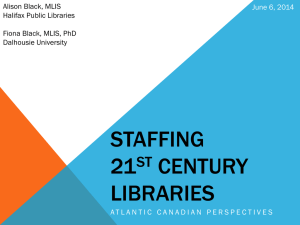Hiring University Librarians Report - Fondren Library
advertisement
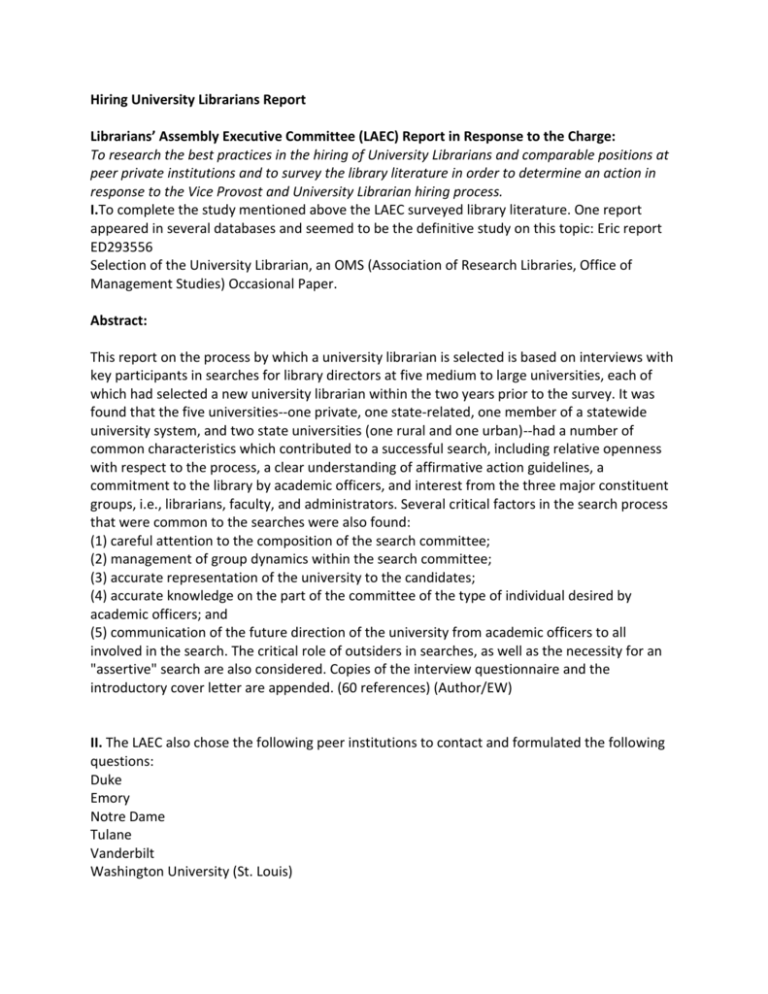
Hiring University Librarians Report Librarians’ Assembly Executive Committee (LAEC) Report in Response to the Charge: To research the best practices in the hiring of University Librarians and comparable positions at peer private institutions and to survey the library literature in order to determine an action in response to the Vice Provost and University Librarian hiring process. I.To complete the study mentioned above the LAEC surveyed library literature. One report appeared in several databases and seemed to be the definitive study on this topic: Eric report ED293556 Selection of the University Librarian, an OMS (Association of Research Libraries, Office of Management Studies) Occasional Paper. Abstract: This report on the process by which a university librarian is selected is based on interviews with key participants in searches for library directors at five medium to large universities, each of which had selected a new university librarian within the two years prior to the survey. It was found that the five universities--one private, one state-related, one member of a statewide university system, and two state universities (one rural and one urban)--had a number of common characteristics which contributed to a successful search, including relative openness with respect to the process, a clear understanding of affirmative action guidelines, a commitment to the library by academic officers, and interest from the three major constituent groups, i.e., librarians, faculty, and administrators. Several critical factors in the search process that were common to the searches were also found: (1) careful attention to the composition of the search committee; (2) management of group dynamics within the search committee; (3) accurate representation of the university to the candidates; (4) accurate knowledge on the part of the committee of the type of individual desired by academic officers; and (5) communication of the future direction of the university from academic officers to all involved in the search. The critical role of outsiders in searches, as well as the necessity for an "assertive" search are also considered. Copies of the interview questionnaire and the introductory cover letter are appended. (60 references) (Author/EW) II. The LAEC also chose the following peer institutions to contact and formulated the following questions: Duke Emory Notre Dame Tulane Vanderbilt Washington University (St. Louis) (Members of the LAEC also knew contacts to interview at Harvard, Yale and the University at North Carolina and added that data to the chart.) Questions Introduction: Members of the committee stated that they were researching the best practices for hiring a university librarian who is as the vice provost level. They then asked: 1. a. In your institution what role do librarians play in hiring the head of the university library system? b. What are that person’s title and job responsibilities? 2. What is your institution’s process for conducting a search at the vice provost (or comparable) level? In a follow-up meeting after some data had been gathered, the LAEC created the following categories for a chart to make comparisons among institutions easier. Explanatory notes were added at the end of the chart to further clarify information. Peer Institution Practices for Hiring a University Librarian (Institutions are listed in chronological order of completion date of the interview.) Institution Univ. Librarian Provost Level Search Committee Includes Library Staff 1.Vanderbilt 2. Yale 3. Duke No No Vice Provost 4. UNC Associate Provost 5. Emory Vice Provost 6.Harvard I Vice Provost Equivalent 7.Harvard II Vice Provost Equivalent 8. Tulane No 9.Washington Vice Chancellor for University Scholarly Resources/Dean of Libraries Restricted Contact with Library Staff Co fro Lib Sta Occasionally No Yes Presentations Open to Library Staff Contact with Library Staff unknown No unknown No Yes Yes Yes unknown No Yes Yes Yes No Yes Yes Yes No Yes Yes Yes No See See Ye no Ye no Ye no un No No No No No Yes Yes Yes Yes Yes Yes No No Ye Ye 10. Notre Dame No 11. Rice Yes Included 3 librarians but no staff Yes Yes Yes No Ye No No Yes Ye Notes: 1. Vanderbilt has not had a consistent way of conducting a search in the past. In the search for the current University Librarian, no librarians were on the committee, but in the past one librarian and the acting director of the library were included on the second time around of a search. 2. Yale has a committee consisting exclusively of faculty members to prepare a list of candidates, decide on finalists, and solicit opinions from some (not all) library staff members regarding those on the short list. The faculty committee makes a decision. For the most part, the process is handled outside the library and librarians have little if any control over the decision. 3. The search committee at Duke includes librarians, support staff, and "other" staff such as IT managers, HR, and faculty in an appropriate Department. There is a talk open to all staff, and selected staff members also meet with the candidates face-to-face. Each member of the library staff has full access to the applications of the candidates who agree to come to campus for the interview. Staff feedback is valued and people are encouraged to send their comments in writing to HR. 4. The library staff at UNC are encouraged to submit comments. 5. The library staff at Emory had two representatives on the search committee. Library staff received feedback through the search committee representatives from the library. 6. The Librarian of Harvard College is responsible for the leadership and administration of the major libraries and numerous departmental and specialized libraries within the Faculty of Arts and Sciences (FAS). The search for this position is run out of the office of the Dean of Arts and Sciences. The search committee consists of faculty and two senior librarians. There is a presentation open to all library staff. 7. Harvard University Libraries are headed by a senior faculty member who holds the title of Carl H. Pforzheimer University Professor and Director of the University Library. In addition to serving as the head of HUL, the director interprets the technical and organizational challenges of the library system to the president and serves as chief steward of the collections for the Harvard Corporation. Right now, the post is held by Robert Darnton, an internationally recognized authority on the history of the book. The search committee is appointed by the President and consists of twelve individuals, including nine faculty members from a range of disciplines, the librarians of Harvard College and the Law School, and the University's Chief Information Officer. There is no presentation for the library staff. 8. At Tulane once the final candidates were chosen by the search committee which included librarians, the process was totally open. Tulane library staff knew the names of the final candidates being interviewed and were given resumes of these candidates. The library as a whole attended presentations from the candidates and were allowed to email comments to the search committee. 9. The search committee at Washington University in St. Louis consisted of faculty and library staff representatives. There was a presentation to the library staff, and staff submitted their comments to the library representatives on the search committee. 10. The last search at Notre Dame was 11 years ago. The candidates made a brief presentation and responded to questions at a meeting that was open to all library employees. There was an open reception and some candidates asked to have meetings with specific individuals or groups. Staff at all levels were welcome to offer input to the search committee. 11. At Rice two Fondren Library department heads were on the search committee and held meetings with library staff to report on the progress of the search. Because at least one candidate requested anonymity, the candidates did not give presentations to the library. Most Rice library staff members neither knew the candidates’ names nor were able to question them in person. However, staff could submit questions and concerns to the search committee. In addition, Fondren staff members representing a cross section of the library met with the candidates as part of the formal search process. III. Summary Although a definitive judgment cannot be made from such a small sample of universities, the limited survey (not including Rice University) and the research report indicate a trend of including library staff in the selection of a University Librarian (UL). Eight out of ten institutions interviewed indicated that librarians served on the search committee. However, one of those eight institutions added librarians to the search committee only after an initial unsuccessful search. Candidates at seven institutions had open contact with and gave presentations to library staff. Interviewees at institutions that did not presently include library staff members in the search process revealed that there was a push for greater participation by librarians in future UL searches. Data may not be 100% accurate since interviewees often answered from memory and stated they were giving their best recollections. Revised report submitted to LAEC Committee, December 3, 2007 by Linda Spiro, LAEC Secretary. Additions (Washington University and Notre Dame) and clarifications (Tulane) were made to the original Nov. 14, 2007 report based on feedback from members of the Librarians’ Assembly. LAEC Committee Members Andy Damico, Chair Phil Montgomery Anna Shparberg Linda Spiro
